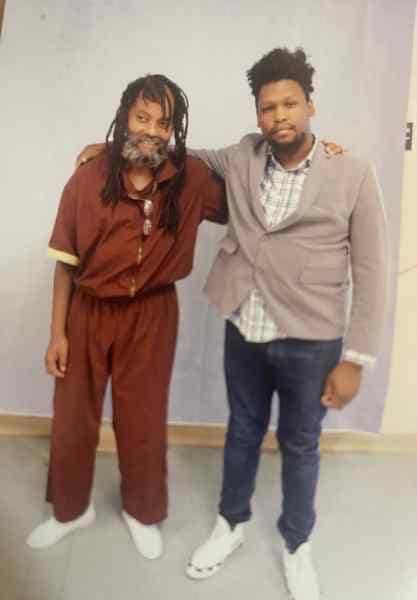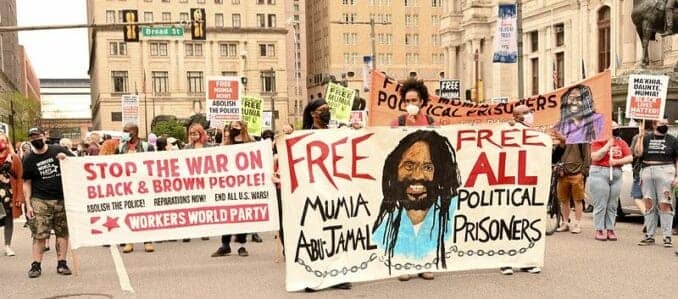
by JR Valrey, Minister of Information, Oakland Bureau
Longtime friend and Philadelphia reporter Linn Washington has been a supporter of political prisoner Mumia Abu-Jamal throughout his 42 years of imprisonment. Millions around the world have argued, and evidence in the case suggests, that he has been framed for his political beliefs.
At this point, there are hordes of people who committed the same crime of killing a Philadelphia police officer in that era and who have been imprisoned and released, exposing the gross miscarriage of justice in keeping Mumia imprisoned because of his political beliefs and his ability through the media to effectively spread them.
In the next 60-90 days, a Philadelphia judge will decide on whether the boxes of undisclosed evidence in Mumia’s case that was kept away from his defense attorneys by the prosecution for over 36 years will grant Mumia Abu-Jamal a new trial, after already serving 42 years in the modern day concentration camps.
This is an important case, with a very important Black political prisoner and revolutionary media-maker who is ailing from several treatable conditions at the heart of it. I’ve had the honor of meeting Mumia Abu-Jamal in person twice, and I interviewed him for print and radio over a dozen times. He is the author of two books that have had a profound effect on me, and those are “Jailhouse Lawyers” and “We Want Freedom.” His regular commentaries that are featured on radio stations throughout the world, after being distributed by Prison Radio, have also taught me a lot.
Check out Linn Washington as he talks about the political imprisonment of Mumia Abu-Jamal in Pennsylvania.
JR Valrey: Can you tell the newcomers who Mumia Abu-Jamal is? Why is he considered a political prisoner?
Linn Washington: Mumia Abu-Jamal is an internationally respected author, activist and scholar imprisoned for the fatal shooting of a Philadelphia, Penn., policeman in December 1981. The numerous flaws in Abu-Jamal’s controversial conviction, plus the fact that his appeals of that conviction have been indignantly rejected on spacious grounds by judges, has caused millions around the world to consider Abu-Jamal a political prisoner – a person imprisoned for their political beliefs, not clear evidence of criminal conduct. Abu-Jamal’s imprisonment is rooted in his unapologetic advocacy of revolutionary Black Nationalism.
JR Valrey: What are some of the striking discrepancies in his case?
Linn Washington: Abu-Jamal’s conviction is based on contradictory claims of guilt from police and prosecutors. The prosecution’s two (alleged) eyewitnesses, who claimed they each saw Abu-Jamal shoot the officer, both testified to not seeing each other despite each (allegedly) standing within eight feet of each other.
One of the only two policemen to testify that Abu-Jamal confessed to shooting the dead officer while laying on an emergency room floor filed an official police report shortly after the shooting declaring Abu-Jamal made “no” comments. Police failed to perform routine tests on Abu-Jamal to determine if he fired a gun. Authorities denied Abu-Jamal’s repeated requests to conduct a routine line-up – defendants rarely, if ever, request a line-up.
The journalistic and scholarly output of Abu-Jamal during the deep deprivations of his imprisonment exceeds the output of most journalists and academics who are not incarcerated.
Authorities in Philadelphia rescinded Abu-Jamal’s bail, but weeks later granted bail to two white men accused of brutally beating a Black man to death. Authorities even allowed those racists to sign their own bail without posting any money for their release.
JR Valrey: Can you talk about how prolific Mumia is as a writer and radio commentator?
Linn Washington: Abu-Jamal was an award-winning journalist at the time of his arrest on Dec. 9, 1981. Since his imprisonment, Abu-Jamal has authored and co-authored over a dozen books. He has written and delivered over 1,000 commentaries on a range of social, political and cultural topics.
He learned two foreign languages during his 30 years in death row isolation before his death sentence was converted to the sentence of life in prison without the possibility of parole (LWOP). He also completed his undergraduate college education, obtained a master’s degree and is working on a Ph.D. The journalistic and scholarly output of Abu-Jamal during the deep deprivations of his imprisonment exceeds the output of most journalists and academics who are not incarcerated.
JR Valrey: Who are some of the main big players who have a political stake in unjustly keeping Mumia imprisoned?
Linn Washington: The primary entity advocating for Abu-Jamal’s initial sentence of execution and his subsequent sentence of life without parole is the Philadelphia police union, the Fraternal Order of Police (FOP). The FOP has an extensive history of backing police brutality and engaging in activities perceived as racist, like backing openly racist candidates for elective office, from segregationist presidential candidate George Wallace in 1968 to the bigoted Donald Trump in 2016 and 2020.
The Pennsylvania Supreme Court panel that dismissed a pivotal 1995 appeal from Abu-Jamal included five justices who had received political support and campaign financing from the FOP. Having five members of a seven member court compromised by FOP entanglement destroyed the “impartiality and appearance of impartiality” by judges that supposedly is a bedrock of the U.S. court system.
The respected human rights organization Amnesty International in a report on the Abu-Jamal case released in February 2000 criticized the FOP-tainted Pennsylvania Supreme Court for its corrupted rejection of strong evidence of innocence and numerous fair trial rights violations contained in Abu-Jamal’s 1995 appeal.
JR Valrey: Can you talk about the history of the Free Mumia Movement over the decades?
Linn Washington: The Free Mumia Movement is unique in many ways. This movement that has established an international presence has existed more than three times longer than the impactful Civil Rights Movement of the 1960s led by Dr. Martin Luther King Jr.
This movement on behalf of Abu-Jamal was founded in Philadelphia in the late 1980s by MOVE related activist Pam Africa. This movement has gained support from government officials across Europe, influential personalities in the U.S. including Hollywood stars and grassroots activists from Mexico to Peru to Ghana and beyond.
Amnesty International in a report on the Abu-Jamal case released in February 2000 criticized the FOP-tainted Pennsylvania Supreme Court for its corrupted rejection of strong evidence of innocence and numerous fair trial rights violations contained in Abu-Jamal’s 1995 appeal.
The movement has been pivotal in intervening on behalf of Abu-Jamal. For example, a few years ago, pressure from this movement forced prison officials to provide life-saving medical care to Abu-Jamal that rescued him from near fatal medical neglect within the prison.
JR Valrey: What is the importance of Mumia being a member of the Black Panther Party?
Linn Washington: In 1969, then a teenaged Mumia Abu-Jamal was a founding member of the Philadelphia Black Panther Party chapter. Abu-Jamal became that chapter’s director of communications.
During his 17 months in BPP, Abu-Jamal worked in Philadelphia and other cities writing for the BPP newspaper. That experience with the BPP newspaper sparked Abu-Jamal’s initial interest in journalism – the craft that became his career prior to his false arrest and wrongful conviction.
During Abu-Jamal’s 1982 trial, the prosecutor maliciously inflamed the jury with references to Abu-Jamal’s BPP membership that ended a decade before his 1981 arrest. The prosecutor told the jury that Abu-Jamal wanted to kill a cop since his time in the BPP, even though Abu-Jamal had no criminal record or even allegations of any involvement with violence or anti-police activities.
JR Valrey: What is going on in Mumia Abu-Jamal’s case currently, and why is it important?
Linn Washington: Currently, Abu-Jamal has an appeal pending in Philadelphia’s city court, where a Black female judge is presiding. This appeal centers on evidence of innocence that prosecutors unlawfully withheld from Abu-Jamal’s lawyers for 36 years.

The law in Pennsylvania and across the U.S. states that prosecutors have an absolute duty to promptly disclose evidence of innocence and/or guilt – a duty not followed in Abu-Jamal’s case. Incredibly, Philadelphia’s District Attorney’s Office has exonerated nearly 30 falsely imprisoned people since 2018, with over 60% of those flawed convictions being based, in part, on evidence illegally withheld by prosecutors and police.
Despite this documented evidence of authorities illegally withholding evidence of innocence, Philadelphia prosecutors claim Abu-Jamal suffered no harm from misconduct by prosecutors and police.
The judge presiding in this appeal initially indicated she would dismiss the appeal, claiming in part that the jury would have still convicted Abu-Jamal without the withheld evidence. That stance by this judge fudges the fact that the issue is not what the jury might have done but the reality that evidence was illegally withheld for over three decades.
One of the illegally withheld items is a handwritten note from a prime witness at the 1982 trial to the trial prosecutor demanding the “money” that witness declared the prosecutor promised him for testifying against Abu-Jamal.
One of the illegally withheld items is a handwritten note from a prime witness at the 1982 trial to the trial prosecutor demanding the “money” that witness declared the prosecutor promised him for testifying against Abu-Jamal.
JR Valrey: What is the correlation between Mumia Abu-Jamal’s case and the civil rights of average people?
Linn Washington: One of the unusual things about the Abu-Jamal case is that this festering injustice is not that unusual within the AmeriKKKan criminal justice system. Thousands of predominantly non-white people are victimized by misconduct from police, prosecutors and judges everyday across the United States.
However, what is unusual about the Abu-Jamal case is that it has generated and received attention worldwide – exposing systemic flaws in America’s legal system. Addressing those flaws in the Abu-Jamal case will have impacts on others enduring injustices.
JR Valrey: What are the “Mumia Exceptions” and “Mumia Laws”?
Linn Washington: Judges in the Abu-Jamal case have bent and broken laws to deny Abu-Jamal the legal relief courts have extended to others raising the same or substantially similar issues.
The failure of courts to follow their proper procedures inclusive of precedence is the definition of “The Mumia Exception” – a phrase that captures the dynamic that the law means the law except in the Mumia case.
Pennsylvania prison authorities now institute restrictive procedures for interviews of all inmates by journalists as a result of efforts to restrict journalists interviewing Abu-Jamal. State legislators have approved measures to impede the ability of Abu-Jamal to function as a writer and scholar. The “Mumia Laws” make a mockery of the so-called American bedrock principle of equal justice under the law.
JR Valrey: How can people stay informed about Mumia Abu-Jamal’s case?
Linn Washington: Information about developments and status of the Mumia case are available from a wide variety of internet based sources. Two of those sources are freemumia.com and bringmumiahome.com.
JR Valrey, journalist, author, filmmaker and founder of Black New World Media, heads the SF Bay View’s Oakland Bureau and is founder of his latest project, the Ministry of Information Podcast. He can be reached at blockreportradio@gmail.com and on Instagram.





